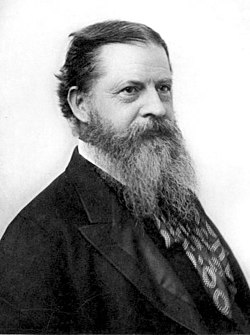| Part of a series on |
| Charles Sanders Peirce |
|---|
 |
| Pragmatism in epistemology |
| Logic |
| Semiotic theory |
| Miscellaneous contributions |
| Biographical |
In logic, Peirce's law is named after the philosopher and logician Charles Sanders Peirce. It was taken as an axiom in his first axiomatisation of propositional logic. It can be thought of as the law of excluded middle written in a form that involves only one sort of connective, namely implication.
In propositional calculus, Peirce's law says that ((P→Q)→P)→P. Written out, this means that P must be true if there is a proposition Q such that the truth of P follows from the truth of "if P then Q".
Peirce's law does not hold in intuitionistic logic or intermediate logics and cannot be deduced from the deduction theorem alone.
Under the Curry–Howard isomorphism, Peirce's law is the type of continuation operators, e.g. call/cc in Scheme.[1]
- ^ Timothy G. Griffin, A Formulae-as-Types Notion of Control, 1990 - Griffin defines K on page 3 as an equivalent to Scheme's call/cc and then discusses its type being the equivalent of Peirce's law at the end of section 5 on page 9.